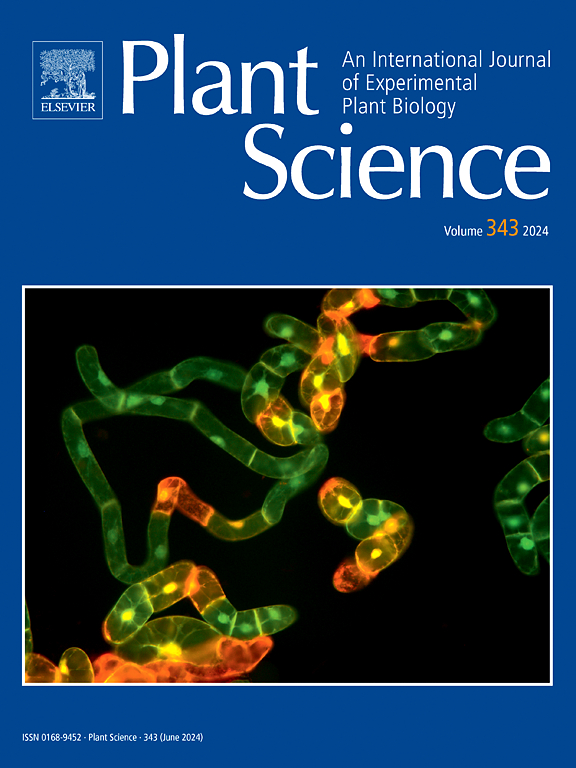从压力到强度:用辣木叶提取物作为生物刺激剂在盐水条件下提高葫芦巴种子的萌发。
IF 4.1
2区 生物学
Q2 BIOCHEMISTRY & MOLECULAR BIOLOGY
引用次数: 0
摘要
促进植物生长的天然生物刺激素经常用于标准和胁迫条件下的植物发育。胡芦巴(Trigonella foenum-graecum L.)是一种芳香药用和蔬菜作物,在世界范围内具有很高的经济价值,受到盐度的负面影响。研究表明,辣木叶提取物(MLE)具有增强植物抗盐胁迫的作用。然而,在盐水条件下,关于MLE对芳香植物,特别是葫芦巴的影响的数据有限。本研究于秋季(2024年10月中旬)在阿里格尔穆斯林大学植物学系环境生理实验室进行,采用完全随机设计,分为4个处理组:(1)对照(无处理),(2)150mM NaCl,(3)无盐胁迫的MLE30 (1:30v:v), (4) 150mM NaCl加MLE30。结果表明,盐胁迫下ROS、Na+和Cl离子的过度积累削弱了植物的生长发育、生理生化特性和有丝分裂。经MLE处理后,种子苗高提高42.74%,鲜重提高26.15%,干重提高20%,发芽率提高30.68%,叶绿素含量提高39.62%,活性氧清除率提高28.39%,脯氨酸含量提高11.5%。盐胁迫下幼苗活力指数提高了86.56%。MLE处理还能促进细胞分裂,有丝分裂指数提高152.94%,酶抗氧化活性增强(SOD: 21.25%, CAT: 36.07%, POD: 13.13%, APX: 37.34%)。非酶抗氧化活性(PPO: 14.70%,类胡萝卜素:24.24%)、淀粉酶活性(α-淀粉酶:39.44%,β-淀粉酶:37.24%)和磷酸酶活性(酸性磷酸酶:30.92%,碱性磷酸酶:32.76%)均有显著提高。此外,耐盐指数提高了18%。研究结果表明,MLE的抗氧化防御机制可以有效清除ROS,保护种子免受盐诱导的氧化损伤,促进种子在盐碱地中的萌发。这些观察结果为MLE30等植物性生物刺激剂的应用提供了宝贵的见解,以提高作物对盐度等非生物胁迫的抵御能力。本文章由计算机程序翻译,如有差异,请以英文原文为准。
From stress to strength: Improving fenugreek seed germination under saline conditions with moringa leaf extract priming as a biostimulant approach
Natural growth-promoting biostimulants are frequently utilized for plant development in standard and stressed conditions. Fenugreek (Trigonella foenum-graecum L.), an aromatic medicinal and vegetable crop that is highly economically important worldwide, has been negatively affected by salinity. According to research studies, moringa leaf extract (MLE) has been demonstrated to enhance resistance to salt stress. However, there is limited data on MLE's impact on aromatic plants, particularly fenugreek, under saline conditions. In this study, conducted in autumn season (mid-October 2024) at the Environmental Physiology Laboratory, Department of Botany, Aligarh Muslim University, we used a completely randomized design with four treatment groups: (1) control (no treatment), (2) 150 mM NaCl, (3) MLE30 (1:30 v:v) without salt stress, and (4) 150 mM NaCl with MLE30. Results indicated that the over accumulation of ROS, Na+ and Cl- ions under salt stress weakened growth or development, physio-biochemical characteristics, and mitotic division. Seeds primed with MLE exhibited significant improvements: seedling height increased by 42.74 %, fresh weight by 26.15 %, dry weight by 20 %, germination by 30.68 %, chlorophyll content by 39.62 %, ROS scavenging by 28.39 %, and proline content by 11.5 %. The seedling vigor index rose by 86.56 % under salt stress. MLE treatment also promoted cell division, increasing the mitotic index by 152.94 % and enhancing enzymatic antioxidant activities (SOD: 21.25 %, CAT: 36.07 %, POD: 13.13 %, APX: 37.34 %). Non-enzymatic antioxidant activities also improved (PPO: 14.70 %, Carotenoids: 24.24 %), along with amylase activities (α-amylase: 39.44 %, β-amylase: 37.24 %) and phosphatase activities (acid phosphatase: 30.92 %, alkaline phosphatase: 32.76 %). Additionally, the salt tolerance index improved by 18 %. The findings suggest that MLE's antioxidant defense mechanism effectively scavenges ROS, providing protection against salt-induced oxidative damage and enhancing the germination of seeds in saline soils. These observations offer valuable insights into the application of plant-based biostimulants like MLE30 to improve crop resilience to abiotic stresses such as salinity.
求助全文
通过发布文献求助,成功后即可免费获取论文全文。
去求助
来源期刊

Plant Science
生物-生化与分子生物学
CiteScore
9.10
自引率
1.90%
发文量
322
审稿时长
33 days
期刊介绍:
Plant Science will publish in the minimum of time, research manuscripts as well as commissioned reviews and commentaries recommended by its referees in all areas of experimental plant biology with emphasis in the broad areas of genomics, proteomics, biochemistry (including enzymology), physiology, cell biology, development, genetics, functional plant breeding, systems biology and the interaction of plants with the environment.
Manuscripts for full consideration should be written concisely and essentially as a final report. The main criterion for publication is that the manuscript must contain original and significant insights that lead to a better understanding of fundamental plant biology. Papers centering on plant cell culture should be of interest to a wide audience and methods employed result in a substantial improvement over existing established techniques and approaches. Methods papers are welcome only when the technique(s) described is novel or provides a major advancement of established protocols.
 求助内容:
求助内容: 应助结果提醒方式:
应助结果提醒方式:


